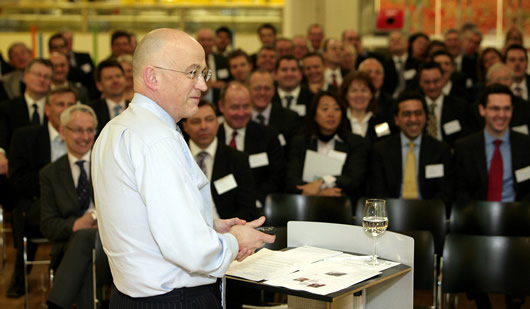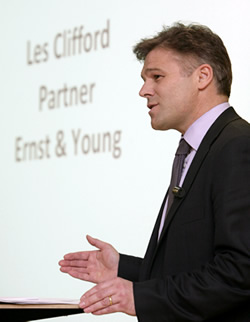First Lancaster University Management School CFO lecture
In the first Lancaster University Management School CFO lecture on the 23 March, Jon Moulton, Managing Partner of private equity firm Alchemy, delivered a compelling summary of the recent economic turbulence and offered a grim vision of the future.

Guests at the CFO lecture included Lancaster University alumni, many of whom have followed careers in the finance professions.
Ernst & Young partner, Les Clifford, who has recently taken on responsibility for managing their CFO Programme, welcomed guests. Mr Clifford delivered high praise for the Lancaster undergraduates he had encountered on the Ernst & Young placement. He was particularly impressed by their professionalism and accomplished approach to their work, which demonstrated considerable maturity.

Moulton began his lecture by quoting the Prime Minister, Gordon Brown, and the Chancellor of the Exchequer, Alistair Darling, in January and March 2008 respectively, apparently in denial of the financial crisis. This was followed by a colourful sequence of happy growth graphs, all delivered with a healthy dose of cynicism, showing the build up to the crisis. Moulton then talked through the crash and explained how the current situation had occurred. Some questionable accounting practices were highlighted, including reference to “unobservable items” featuring on balance sheets and in Annual Reports.
Moulton's expectations were gloomy, but based on the information presented, seemed entirely plausible. During his speech, he referred to and recommended an analysis of past recessions by Carmen Reinhart & Kenneth Rogoff of Harvard Business School.
He also cast doubt on the popularly held belief that the global economy could look to the burgeoning markets of China and India for salvation, illustrating his point with graphical data on the recent dramatic drop in output experienced by China.

In the interim, Moulton referred to two possible scenarios: Global Japan (deflation) or Global Zimbabwe (hyper inflation). He cautioned that the situation’s instability made an accurate prediction virtually impossible, but suggested that the answer would be known within three years.
In the Q&A session chaired by Professor Cary Cooper, Pro Vice-Chancellor for Lancaster University, Moulton cited confidence as the key to bringing about change.
Nick Talbot of KPMG asked which countries would be best to invest in. The response was “any country that has good banks and a relatively self-contained economy”. Canada was given as an example, and Switzerland mentioned as a less than promising prospect.
Richard Morrice of People Energies asked whether it was time for a New World Order, a restructuring of capitalism. Moulton suggested that socialism is advancing by default, and highlighted the Swedish model of inspiring confidence to address their recession in the 90s. He then deferred the question to Professor Cooper as he said the answer lay more in the realm of psychology than economics.
Asked why no one saw the crisis coming, Moulton answered “because everyone was enjoying it”. He said that very few people did see it coming, mentioning it was a minority sport which made those doing so “not at all popular”.
Moulton was asked by Mark Simpson of BP where he will be putting his money in the light of his predictions for the future. He explained that the weak companies with weak management are the first to go, followed by weak companies with mediocre management. After this the good companies with weak management are next to suffer, and this is where private equity companies are able to operate successfully. This is only advisable after the recession has reached its lowest point and he reiterated his belief that this point had yet to be reached.
Professor Sue Cox, Dean of Lancaster University Management School thanked Mr Moulton for his lecture and Ernst & Young for hosting the event. She went on to describe the success that Lancaster University Management School has achieved, and stated that an example of hope to be found in these times is in the excellent young people that graduate from Lancaster.